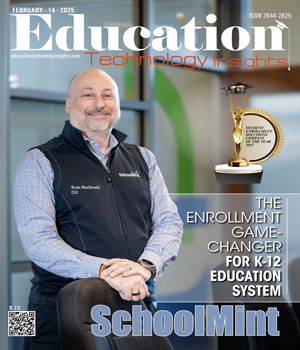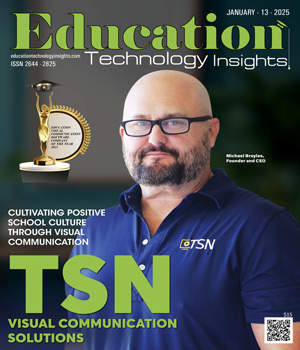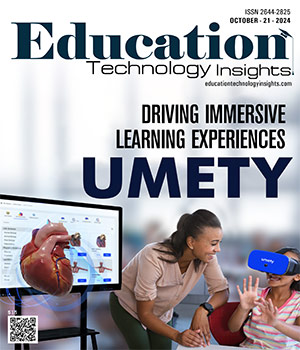THANK YOU FOR SUBSCRIBING
Be first to read the latest tech news, Industry Leader's Insights, and CIO interviews of medium and large enterprises exclusively from Education Technology Insights
The New Learning Ecosystem: AI-Driven, Hybrid and Human-Centered Learning for the Future
Dr. Eric A. Canny, Assistant Teaching Professor of Education, University of Southern California
 Dr. Eric A. Canny, Assistant Teaching Professor of Education, University of Southern California
Dr. Eric A. Canny, Assistant Teaching Professor of Education, University of Southern CaliforniaThrough this article, Canny delves into the transformation of education and training through technology and AI-driven personalization, aiming to create a skills-focused ecosystem that adapts to the evolving needs of both learners and the workforce.
Education and training are undergoing a rapid transformation, driven by technology, shifting learner expectations and evolving workforce demands. The COVID-19 pandemic accelerated the adoption of hybrid and online learning, giving rise to a new learning ecosystem. This ecosystem blends in-person, hybrid and online learning experiences with advanced technologies—such as artificial intelligence (AI), extended reality (XR) and data analytics—to drive personalization, engagement and equity.
This new model represents more than just flexible learning formats. It’s a connected network of digital platforms, virtual and physical spaces, AI-powered tools and a focus on lifelong learning. It supports learners in building future-ready skills and helps educators and employers stay agile in a changing world.
The Evolution of Learning and Training
Traditionally, education focused on in-person instruction. With the digital age came e-learning and MOOCs and now the emphasis has shifted again—from content delivery to learner adaptability. Hybrid and online models are now dominant in both education and workforce development. The World Economic Forum (2023) estimates that over half of global workers will need reskilling by 2027, reinforcing the need for agile, tech-enabled ecosystems.
“Traditionally, education focused on in-person instruction. With the digital age came e-learning and MOOCs and now the emphasis has shifted again—from content delivery to learner adaptability”
Online Learning:
Personalized and Scalable Online learning offers notable benefits:
• Flexibility and Reach: Learners can access training across time zones and locations—key for professional development.
• AI-Powered Personalization: Adaptive platforms and learning experience platforms (LXPs) tailor content to individual learning paths.
• Cost Efficiency: Employers and institutions can reduce costs while expanding access.
Still, challenges remain. Engagement can be low in poorly designed programs and dropout rates are high without human connection. The digital divide also impacts access. Inclusive, mobile-first platforms with built-in support like mentorship and peer networks are essential.
Hybrid Learning: Merging Flexibility and Structure
Hybrid learning blends live, in-person instruction with online, self-paced elements, offering structure and adaptability.
• Engaging Design: Combining real-time collaboration with self-directed learning boosts satisfaction and outcomes.
• Workforce Applications: Companies use hybrid platforms for upskilling, often with gamification, simulations and scenario-based modules.
• Educator Readiness: Success depends on faculty embracing digital pedagogy and ongoing professional development.
Effective hybrid environments require thoughtful planning, strong infrastructure and a focus on equity to meet diverse learner needs.
In-Person Learning: Connection and Context
Despite digital advances, in-person learning still plays a key role in building emotional intelligence, collaboration and leadership.
• Human-Centered Approach: Face-to-face settings enable mentorship, hands-on practice and real-time feedback—critical for skills like empathy and teamwork.
• Experiential Learning: Labs, workshops and design sprints bring learning to life in authentic contexts.
However, geographic and scheduling limitations—and high infrastructure costs—can limit scalability.
Skills-Based Learning: Redefining Careers
The traditional path of degrees and titles is being replaced by a skills-first approach. Employers increasingly prioritize specific competencies over credentials.
• Skills as Currency: AI-powered platforms now map employee skills and identify gaps, promoting internal mobility and targeted hiring.
• Microcredentials: Learners are earning stackable, short-form credentials tied to outcomes. Digital badges and portfolios help them showcase real-world capabilities.
• Workforce Agility: Skills-based frameworks allow for career pivots and greater resilience in the face of disruption.
This shift calls for interoperable systems where skills are recognized across employers, industries and institutions.
AI and the Future of Learning
AI is reshaping the learning landscape. It personalizes content, streamlines assessments and offers intelligent tutoring and coaching.
• Generative AI is now used to develop course content, chatbots and assessments.
• XR Technologies (AR/VR) provide immersive training experiences in areas like healthcare, engineering and safety.
• Blockchain ensures secure, verifiable credentials and learning records for lifelong learners.
These tools strengthen the connection between learning and work by enabling dynamic, skills-based learning pathways aligned with industry needs.
Designing the New Ecosystem
To fully realize this future, educators and employers must:
1. Center Learning on the Learner: Use AI and data to personalize learning and support student success.
2. Develop Faculty and Trainers: Invest in training for digital instruction, equity and ethical AI use.
3. Adopt Flexible Infrastructure: Create seamless, mobile-first platforms that support diverse modalities.
4. Encourage Collaboration: Co-design programs with input from educators, technologists, employers and learners.
5. Enable Lifelong Learning: Integrate micro credentials and on-demand learning into educational and workplace systems.
The new learning ecosystem is a mindset—one that blends AI, hybrid delivery and human-centered design. It offers a resilient, inclusive and adaptive approach to lifelong learning, where education and employment intersect. As the pace of change accelerates, investing in flexible, skills-focused learning is essential.
Read Also
Building Future Leaders with Faith and Integrity
Virtualization as a Bridge For Multi-Campus Support
Building Practical Readiness in Cybersecurity Talent
The Liberal Arts to the Rescue
Faith Based Counseling Supporting Holistic Student Growth
Will ChatGPT End Higher Ed? Not So Fast

I agree We use cookies on this website to enhance your user experience. By clicking any link on this page you are giving your consent for us to set cookies. More info















-(2)-1.jpg)






